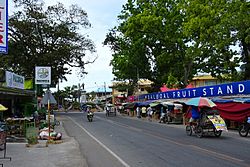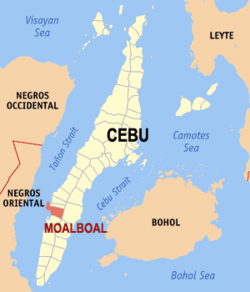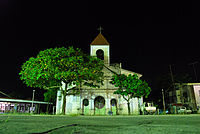Moalboal
This article needs additional citations for verification. (April 2013) |
Moalboal | |
|---|---|
| Municipality of Moalboal | |
 Poblacion (town centre) | |
 Flag | |
 Map of Cebu with Moalboal highlighted | |
show OpenStreetMap | |
 Moalboal Location within the Philippines | |
| Coordinates: 9°57′N 123°24′E / 9.95°N 123.4°ECoordinates: 9°57′N 123°24′E / 9.95°N 123.4°E | |
| Country | Philippines |
| Region | Central Visayas |
| Province | Cebu |
| District | 7th district |
| Founded | 6 February 1852 |
| Barangays | 15 (see Barangays) |
| Government | |
| • Type | Sangguniang Bayan |
| • Mayor | Paz A. Rozgoni |
| • Vice Mayor | Inocentes G. Cabaron |
| • Representative | Peter John D. Calderon |
| • Municipal Council | show
Members |
| • Electorate | 22,455 voters (2019) |
| Area | |
| • Total | 124.86 km2 (48.21 sq mi) |
| Elevation | 30 m (100 ft) |
| Highest elevation | 253 m (830 ft) |
| Lowest elevation | 0 m (0 ft) |
| Population (2020 census) [3] | |
| • Total | 36,930 |
| • Density | 300/km2 (770/sq mi) |
| • Households | 7,226 |
| Economy | |
| • Income class | 4th municipal income class |
| • Poverty incidence | 26.58% (2015)[4] |
| • Revenue | ₱110,298,289.45 (2016) |
| Service provider | |
| • Electricity | Cebu 1 Electric Cooperative (CEBECO 1) |
| Time zone | UTC+8 (PST) |
| ZIP code | 6032 |
| PSGC | |
| IDD : area code | +63 (0)32 |
| Climate type | tropical rainforest climate |
| Native languages | Cebuano Tagalog |
| Website | www |
Moalboal, officially the Municipality of Moalboal (Cebuano: Lungsod sa Moalboal; Tagalog: Bayan ng Moalboal), is a 4th class municipality in the province of Cebu, Philippines. According to the 2020 census, it has a population of 36,930 people. [3]
Extending as a peninsula on the south-western tip of Cebu, Moalboal is bordered to the west by the Tañon Strait. Negros Island can be seen from the western shoreline. Moalboal is located 89 kilometres (55 mi) from Cebu City, about 2½ hours by public bus.
Moalboal is bordered to the north by the town of Alcantara, to the west is the Tañon Strait, to the east is the town of Argao, and to the south is the town of Badian.
Pescador Island, a popular tourist attraction, is part of the municipality.
Barangays[]
Moalboal comprises 15 barangays:
| PSGC | Barangay | Population | ±% p.a. | Date of Fiesta | |||
|---|---|---|---|---|---|---|---|
| 2020 [3] | 2010 [5] | ||||||
| 072233001 | Agbalanga | 2.5% | 940 | 916 | 0.25% | 29 September | |
| 072233002 | Bala | 1.9% | 700 | 697 | 0.04% | ||
| 072233003 | Balabagon | 4.9% | 1,825 | 1,572 | 1.45% | 5 April | |
| 072233004 | Basdiot | 16.1% | 5,949 | 5,291 | 1.14% | 27 April | |
| 072233005 | Batadbatad | 3.6% | 1,318 | 1,248 | 0.53% | ||
| 072233006 | Bugho | 4.9% | 1,824 | 1,430 | 2.38% | 28 January | |
| 072233007 | Buguil | 2.0% | 756 | 710 | 0.61% | ||
| 072233016 | Busay | 3.5% | 1,309 | 1,167 | 1.11% | ||
| 072233008 | Lanao | 3.9% | 1,424 | 1,352 | 0.50% | ||
| 072233010 | Poblacion East | 6.8% | 2,521 | 2,223 | 1.22% | 3 May | |
| 072233011 | Poblacion West | 8.8% | 3,240 | 2,742 | 1.62% | 3 May | |
| 072233012 | Saavedra | 7.8% | 2,881 | 2,618 | 0.93% | 15 October | |
| 072233013 | Tomonoy | 5.5% | 2,018 | 1,874 | 0.72% | 8 December | |
| 072233014 | Tuble | 5.4% | 2,012 | 1,591 | 2.29% | 21 January | |
| 072233015 | Tunga | 6.5% | 2,413 | 2,245 | 0.70% | 17 September | |
| Total | 36,930 | 27,676 | 2.82% | ||||
Climate[]
| hideClimate data for Moalboal, Cebu | |||||||||||||
|---|---|---|---|---|---|---|---|---|---|---|---|---|---|
| Month | Jan | Feb | Mar | Apr | May | Jun | Jul | Aug | Sep | Oct | Nov | Dec | Year |
| Average high °C (°F) | 29 (84) |
30 (86) |
31 (88) |
32 (90) |
31 (88) |
30 (86) |
30 (86) |
30 (86) |
30 (86) |
29 (84) |
29 (84) |
29 (84) |
30 (86) |
| Average low °C (°F) | 22 (72) |
22 (72) |
23 (73) |
24 (75) |
25 (77) |
25 (77) |
24 (75) |
24 (75) |
24 (75) |
24 (75) |
24 (75) |
23 (73) |
24 (75) |
| Average precipitation mm (inches) | 42 (1.7) |
34 (1.3) |
40 (1.6) |
61 (2.4) |
124 (4.9) |
188 (7.4) |
190 (7.5) |
191 (7.5) |
189 (7.4) |
186 (7.3) |
124 (4.9) |
73 (2.9) |
1,442 (56.8) |
| Average rainy days | 10.0 | 8.5 | 9.5 | 12.8 | 22.3 | 26.8 | 28.4 | 27.9 | 27.3 | 27.6 | 20.5 | 13.1 | 234.7 |
| Source: Meteoblue [6] | |||||||||||||
Demographics[]
| Year | Pop. | ±% p.a. |
|---|---|---|
| 1903 | 11,743 | — |
| 1918 | 14,897 | +1.60% |
| 1939 | 14,868 | −0.01% |
| 1948 | 15,019 | +0.11% |
| 1960 | 13,745 | −0.74% |
| 1970 | 15,679 | +1.32% |
| 1975 | 16,182 | +0.64% |
| 1980 | 16,420 | +0.29% |
| 1990 | 20,041 | +2.01% |
| 1995 | 22,021 | +1.78% |
| 2000 | 23,402 | +1.31% |
| 2007 | 27,398 | +2.20% |
| 2010 | 27,676 | +0.37% |
| 2015 | 31,130 | +2.27% |
| 2020 | 36,930 | +3.42% |
| Source: Philippine Statistics Authority [7] [5] [8][9] | ||
Though the majority of the people in Moalboal are Cebuanos, a few members of cultural minorities have found their way there. Bajaus who are similar to Muslim nomads, are often seen in the streets, especially during the holiday season, as some of them make their living by begging. There is no evidence though that the badjaos have taken up permanent residence in the town.
Due to the tourism boom that the town has experienced in the 2000s and 2010s, a small contingent of expatriates have also started to settle in Moalboal. Europeans and Americans are the most prominent expatriates in the town, but recently, expatriates from East Asian countries have also started to settle in the area.
Economy[]
| Poverty Incidence of Moalboal | |
| Source: Philippine Statistics Authority[10][11][12][13][14][15] | |
Moalboal is a peninsula and therefore it is almost entirely surrounded by water. The majority of the people who live in the flat lands engage in fishing as their main mode of livelihood. Those who live in the mountain regions, like Agbalanga and Bala, live through farming.
The common mode of transportation is by bicycles with side cars, known locally as pedicabs or, depending on the distance, tricycles with side cars, called trisikads.
Tourism[]

Since the 1970s, Moalboal has developed a tourism industry based on recreational diving and beaches. Panagsama Beach (Basidot) is where most resorts and restaurants are established, while further north on the peninsula, in Saavedra, is White Beach (Basdako), a two-kilometre (1.2 mi) beach. This beach used to be mostly frequented by locals, but has since developed an international tourist trade.
In Moalboal, most tourists stay at either Panagsama Beach (Basdiot) or White Beach (Basdako), both located 3–5 kilometres (1.9–3.1 mi) away from the main bus stop in Moalboal.




Recreational diving is the main tourist activity in Moalboal, and reefs along the west coast of the Copton peninsula are home to a great variety of marine life. Pescador Island, about 3 kilometres (1.9 mi) off the coast, is the most popular dive spot with an underwater cave known as "the Cathedral". Indeed, a breath-taking view of the underwater world as some of the country's best diving sites in Moalboal as the terrain of the reef follows the entire coast line, making the place ideal for scuba-diving, snorkeling and freediving, with a shallow drop-off close to shore dropping down to more than 40 metres (130 ft). The area is also known to be a sanctuary for sea turtles, as well as vast schools of sardines. nearby Pescadores Seaview Suites. Whale shark, dolphins and threshers are also seen out of the blue.
Moalboal has been featured by several Filipino TV show hosts, such as Kuya Kim Atienza of Matanglawin, Drew Arellano of Biyahe ni Drew, Slater Young, and Kryz Uy.
Moalboal also serves as a base for other activities, such as canyoneering in Badian and the Kawasan Falls, 20 kilometres (12 mi) away from Moalboal.
Currently, tours are only booked online thru the Cebu Provincial Tourism Portal
Fiesta[]
The annual feast of Moalboal is held on the 15 and 16 of May. Moalboal is known also for its "Kagasangan Festival" (coral) in which they perform tribal dances and music. It is held in honor of St. John of Nepomuk, the town's patron saint.
Gallery[]
Moalboal Municipal Hall
White Beach

Coral reef

Moalboal Church
References[]
- ^ Municipality of Moalboal | (DILG)
- ^ "2015 Census of Population, Report No. 3 – Population, Land Area, and Population Density" (PDF). Philippine Statistics Authority. Quezon City, Philippines. August 2016. ISSN 0117-1453. Archived (PDF) from the original on May 25, 2021. Retrieved July 16, 2021.
- ^ Jump up to: a b c Census of Population (2020). "Region VII (Central Visayas)". Total Population by Province, City, Municipality and Barangay. PSA. Retrieved 8 July 2021.
- ^ https://psa.gov.ph/sites/default/files/City%20and%20Municipal-level%20Small%20Area%20Poverty%20Estimates_%202009%2C%202012%20and%202015_0.xlsx; publication date: 10 July 2019; publisher: Philippine Statistics Authority.
- ^ Jump up to: a b Census of Population and Housing (2010). "Region VII (Central Visayas)". Total Population by Province, City, Municipality and Barangay. NSO. Retrieved 29 June 2016.
- ^ "Moalboal: Average Temperatures and Rainfall". Meteoblue. Retrieved 10 May 2020.
- ^ Census of Population (2015). "Region VII (Central Visayas)". Total Population by Province, City, Municipality and Barangay. PSA. Retrieved 20 June 2016.
- ^ Censuses of Population (1903–2007). "Region VII (Central Visayas)". Table 1. Population Enumerated in Various Censuses by Province/Highly Urbanized City: 1903 to 2007. NSO.
- ^ "Province of Cebu". Municipality Population Data. Local Water Utilities Administration Research Division. Retrieved 17 December 2016.
- ^ "Poverty incidence (PI):". Philippine Statistics Authority. Retrieved 28 December 2020.
- ^ https://psa.gov.ph/sites/default/files/NSCB_LocalPovertyPhilippines_0.pdf; publication date: 29 November 2005; publisher: Philippine Statistics Authority.
- ^ https://psa.gov.ph/sites/default/files/2003%20SAE%20of%20poverty%20%28Full%20Report%29_1.pdf; publication date: 23 March 2009; publisher: Philippine Statistics Authority.
- ^ https://psa.gov.ph/sites/default/files/2006%20and%202009%20City%20and%20Municipal%20Level%20Poverty%20Estimates_0_1.pdf; publication date: 3 August 2012; publisher: Philippine Statistics Authority.
- ^ https://psa.gov.ph/sites/default/files/2012%20Municipal%20and%20City%20Level%20Poverty%20Estima7tes%20Publication%20%281%29.pdf; publication date: 31 May 2016; publisher: Philippine Statistics Authority.
- ^ https://psa.gov.ph/sites/default/files/City%20and%20Municipal-level%20Small%20Area%20Poverty%20Estimates_%202009%2C%202012%20and%202015_0.xlsx; publication date: 10 July 2019; publisher: Philippine Statistics Authority.
External links[]
| Wikimedia Commons has media related to Moalboal. |
| Wikivoyage has a travel guide for Moalboal. |
- Municipalities of Cebu






